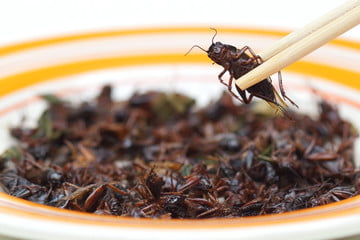This article was originally publisehd by Rhoda Wilson at The Daily Exposé.
Singapore became the latest country to authorize insect products for human consumption, in what The Guardian described as a move that “paves the way for plates to become wrigglier, leggier and more sustainable” and as “a sign of things to come.”
In an announcement on 8 July, the Singapore Food Agency said it had approved 16 insects for human consumption as food, making it the latest country to do so. The approved insects include silkworm pupa and mealworms.
The European Union, the United Kingdom, Australia, and other countries have also approved certain insects for human consumption, with clear labeling requirements for food products containing insects.
Gaps in US regulations have enabled “alternative protein” startups to enter the insect food market – with the backing of figures such as Bill Gates and government agencies including the United Nations (“UN”), the Defence Advanced Research Projects Agency (“DARPA”) and the National Science Foundation.
The trend towards insect-based foods is linked to the UN’s Agenda 2030 SDGs, promoting sustainability and forced behavioral modifications.
“The insect craze is intimately connected to the UN’s Agenda 2030 Sustainable Development Goals (SDGs),” said Michael Rectenwald, author of ‘The Great Reset and the Struggle for Liberty: Unravelling the Global Agenda’.
“The World Economic Forum – perhaps the largest driving force behind so-called ‘alternative proteins’ – frequently touts Singapore’s compliance with Agenda 2030, so the decision to prioritize insect-based foods is not surprising,” Seamus Bruner, author of ‘Controligarchs: Exposing the Billionaire Class, their Secret Deals, and the Globalist Plot to Dominate Your Life’ and director of research at the Government Accountability Institute, said.
Proponents of insects as food for humans, including the UN Food and Agricultural Organisation (“FAO”), claim that they are more sustainable and have a lower carbon footprint compared to traditional livestock. However, animal-based foods like beef, pork, and poultry are more efficient and healthy sources of protein.
“The truth is that beef, pork, poultry and other animal-based foods are the most efficient and healthy sources of protein. These climate fanatics pushing insect-based foods are scaring people into adopting less healthy diets,” Bruner told The Defender.
While advocates see insects as a viable protein source for the future, there are concerns about safety and health risks, such as parasites and allergies, and it raises questions about the motives behind promoting insect-based foods.
“The justification for insects is to produce protein using fewer inputs: to save the planet by reducing climate change, methane from cows, less pollution,” Dr. Meryl Nass, founder of Door to Freedom, said. “But just because it is protein doesn’t mean it’s good for us.”
Nass cited parasites that could be spread by insects, difficulties in digesting insects, and common allergies to chitin – commonly found on the exoskeleton of insects.
She suggested that one reason behind the shift to insects as food is “to cause emotional harm: to degrade, debase, downgrade human beings” and that beef is “being demonized,” potentially to “weaken the species.”
Dutch journalist Elze van Hamelen told The Defender that using insect ingredients for pet food also poses a risk to public health, citing a 2019 study that found parasites in 244 of 300 insect farms and pet stores that were investigated.
In Singapore, local businesses are embracing insect-based foods, with some already offering insect-infused dishes. Educational programs are being implemented to inform consumers, including children, about the benefits of consuming insects.
Some educational programs began before approval had been obtained. For example, Singapore’s first start-up to make food from insects conducted workshops and educational sessions at almost a hundred schools before the Singapore Food Agency approved insects for human consumption. Surveys conducted after the program found that about 80% of students would be willing to try the insects after they are approved.
Educational programs are part of the psychological techniques deployed to get people to accept insects as food. Several studies in 2020, 2021, and 2022 suggested that behavioral science concepts like nudging should be used to influence public acceptance of insect-based foods. The truth is that nudging is already being widely used to implement the UN’s Agenda 2030.
According to Rectenwald, “sustainability” is code language for coerced reductions in consumption and forced behavioral modifications.
In addition to debasing people and so gaining psychological power over them, there is enormous financial gain to be had for those driving the insect-based diets agenda.
“Bill Gates claims his investments in alternative proteins are to save the planet,” Bruner said. “What he does not say is that they are part of a strategy to monopolize the protein industry – for profit – as he lobbies to ban animal-based competition.”
The above is summarised from the article ‘Sign of Things to Come: Singapore Approves 16 Insects for Human Food’ by Michael Nevradakis, PhD, as published by The Defender. You can read the full article HERE.
Featured image: Fried silkworm pupas in Thailand. Silkworms are among the species on Singapore’s list of insects approved for human consumption. Source: The Guardian
Read full article here


